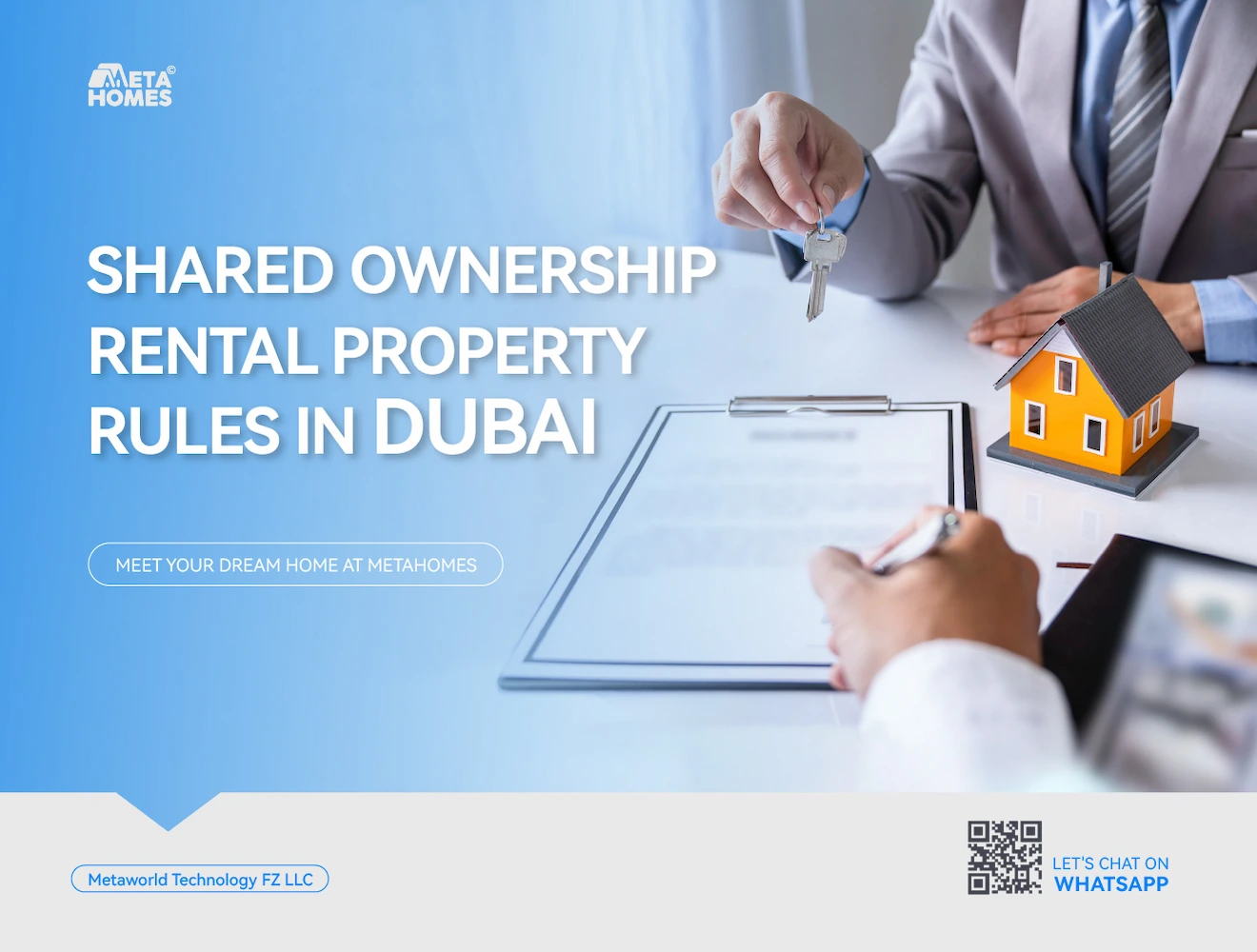
Shared ownership (also called joint ownership, co-ownership, or fractional ownership) is when two or more people hold legal title to the same property.
That can look different in practice: sometimes each owner has a fixed percentage share recorded on the title (fractional / tenants-in-common style), and sometimes ownership is equal and more tightly joined (joint tenancy).
In Dubai, both models operate, and the key point is that each co-owner’s share and rights should be recorded on the title deed at the Dubai Land Department (DLD).
If you and one or more co-owners want to rent the property (anything from a studio flat to a villa for rent in Dubai), you can, but only if you follow the legal steps and building/developer rules.
The rules exist to protect co-owners, tenants, and the wider community (building management, master community declarations, etc.).
Practical issues come up quickly: who signs the tenancy contract, how rental income is split, who handles maintenance, and whether building rules or the master community declaration allow leasing at all.
Several market guides and legal summaries clarify that leasing jointly owned property is possible, but subject to conditions.
The legal backbone: Law No. (6) of 2019
Dubai’s core legal framework for this area is Law No. (6) of 2019 Concerning Ownership of Jointly Owned Real Property.
The law and its implementing regulations set out how jointly owned projects (master communities, strata developments, etc.) must be declared, how management rules are made, and what co-owners’ rights and responsibilities are.
That includes provisions about building management regulations, master community declarations, and how disputes are handled, all of which affect whether and how co-owners can lease their share.
If a Jointly Owned Property Declaration (or the building’s management rules) restricts leasing, those rules will be decisive.
Common terms you’ll see
- Jointly Owned Property Declaration / Building Management Regulation: the document that governs what owners can and cannot do in the development (including leasing rules). (Dubai Land Department)
- Title deed share: the percentage recorded by DLD that shows who owns what.
- Fractional ownership/timeshare vs fractional equity: fractional equity means actual ownership shares (you can rent and sell your share, subject to rules); timeshare is different (use rights only). Be careful to know which model you’re dealing with.
Practical Rules for Renting Out a Shared Ownership Property in Dubai
Here’s a breakdown of the rules for renting out a shared ownership property in Dubai:
Consent from all co-owners is mandatory
In Dubai, you cannot just decide to put the property up for rent on your own if you only own a share.
Whether it’s a studio apartment for rent in Dubai or a large villa for rent in Dubai, all listed owners on the title deed need to agree before the property can be leased.
This prevents disputes later on about income, tenant rights, or property upkeep. In most cases, the Dubai Land Department (DLD) and Ejari (the official rental registration system) will not even process a tenancy contract unless it is signed or approved by all owners or their legally appointed representative.
Structure of the power of attorney or representative
If one owner lives in another country or doesn’t want to deal with the paperwork, the group can choose a representative through a power of attorney.
That individual can then sign the lease, register it with Ejari, and speak for all the co-owners when they talk to the tenant.
This happens a lot when a group of investors buy apartments in Dubai collectively, but only one of them lives there.
Ejari registration rules
All tenancy contracts in Dubai must be registered on Ejari. For shared ownership property, the system requires either all owners to appear on the contract or an officially documented representative. Without Ejari, tenants cannot connect utilities or resolve disputes legally, so this step is crucial.
Community and building rules
Some developments, especially those with homeowners’ associations, may have restrictions on leasing.
For example, certain premium towers or villa compounds may require leases to be for a minimum period (like six months or a year). Others may restrict short-term subletting altogether.
So before you market a studio flat in Dubai or a 2-bedroom apartment for rent in Dubai under shared ownership, check the master community declaration or building management rules.
Sharing the costs and rental income
If more than one person owns an apartment for rent in Dubai, the rental income should be split up based on how much each owner owns, as shown on the title deed. This doesn’t have to be equal unless the deed says that the shares are equal.
Costs like service charges, maintenance fees, and repair bills should be shared according to how much each person owns. Many investors choose to write a co-ownership agreement before they list a unit for rent.
Dealing with disagreements amongst co-owners
If there are problems, such as one owner wanting to rent the flat and another wanting to keep it empty or use it themselves, the DLD can send the case to the Rental Disputes Centre (RDC).
The RDC can look at the ownership shares and make a decision about whether or not the property can be rented.
Before renting a property in Dubai, it’s a good idea to have a co-ownership agreement that clearly spells out each person’s rights and responsibilities. This will help prevent you from getting to this point.
Short-term vs long-term rental considerations
Long-term leases: These are the most common types of yearly rental agreements in Dubai. They are great for people who want to rent a flat in Dubai, UAE, for a longer period (usually a one-year contract). In this type of rental consideration, all shareholders of it must agree, and the amazing thing is that the income is predictable.
Short-term leases: If you want to turn your property into a vacation home, you’ll need to get more permission from Dubai’s Department of Economy and Tourism. This method can provide you with larger returns, but it usually means you have to follow the rules more closely.
When you share ownership, short-term leasing might be hard since not all co-owners may want to deal with the difficulty of running the business.
How to Set Up and Run Shared Ownership Rentals in Dubai the Right Way
It’s not enough to just find a tenant when you rent out a property in Dubai that you share with someone else.
To make sure everything is in order and to avoid any problems, co-owners need to do certain things, fill out the right forms, and make agreements.
How to Make a Co-Ownership Agreement
Before renting out the flat in Dubai, the co-owners should write down how they will share it.
This agreement should make it clear who owns what, like 50/50 or 70/30.
– How the rental income will be divided, based on how much share each person owns.
– Who is in charge of doing things like screening tenants, collecting rent, and fixing things?
– What to do when you have to make big decisions, like selling the house, changing tenants, or making repairs.
– How to resolve differences if they arise.
Without this agreement, even small decisions can lead to long misunderstandings and court cases that would have been avoided.
Registering Ownership with the Dubai Land Department (DLD)
The DLD gives you a title deed when you buy something. This deed lists all the co-owners and how much property they own.
This document serves as the basis for all upcoming rental agreements. You might not be able to rent out a property legally if it isn’t registered correctly.
Ejari Registration for Rental Agreements
In Dubai, it’s important to register every rental contract with Ejari, which is the official system run by the Real Estate Regulatory Agency (RERA).
All co-owners listed on the title deed must either sign the tenancy agreement themselves or give one co-owner permission to do so with a Power of Attorney (POA).
– The rental agreement should make it clear what the legal details of the property are and how much rent we’ve agreed on.
– Tenants need Ejari to open DEWA accounts or to file complaints about their rent.
Get Property Management Companies to Help
Many people who own property together would rather hire a property management company to handle everything for them.
These companies advertise the property, whether it’s a villa for rent in Dubai, a two-bedroom apartment for rent in Dubai, or even a studio apartment for rent in Dubai. Check out possible renters, handle lease negotiations, and register Ejari.
– Get the rent and split it up among the co-owners according to how much of the property they own.
– Handle repairs, maintenance, and emergencies.
Property managers do charge a fee, which is usually between 5% and 7% of the rent for the year. But they make things easier by taking care of all the different tasks for co-owners.
Costs, taxes, and other financial issues related to renting out shared ownership in Dubai
One of the main reasons people want to rent out property in Dubai is that the taxes are low there.
There isn’t a direct property tax or rental income tax, but co-owners still need to make plans for costs and other financial obligations.
No Income Tax on rental Earnings
Dubai does not have a personal income tax. This implies that anyone who owns properties in Dubai, whether they are renting out a studio flat or a villa, can make money from their rentals without having to give the government a cut.
The amount of rent that each co-owner gets is based on how much share of the property they own, and that amount is tax-free.
Service Charges and Maintenance Charges
Every property in Dubai has to pay annual service fees to the developer or community management.
These include items like gardening, building security, and shared amenities. In shared ownership, these costs are frequently split up based on how much each person owns.
If you co-own a one-bedroom flat in Dubai and own 60% of it, you pay 60% of the service charges.
Co-owners also share the price of repairs and upkeep. This could mean fixing the air conditioning, the plumbing, or even making bigger changes if necessary.
Furnishing and Fit-out Costs
Most people who prefer renting furnished apartments in Dubai prefer ones that are already furnished, especially if they only need them for a short time.
When co-owners decide to furnish a property for rent in Dubai every month, they also need to agree on who will pay for the furniture, appliances, and decorations. You have to pay money up front on this investment, but it can make the house more appealing.
Management Fees
The good thing is that the management takes care of everything, from advertising the property to collecting rent.
Security Deposits Refunds
Tenants normally have to pay a security deposit, which is 5% of the annual rent for an unfurnished flat and 10% for a furnished apartment in Dubai.
The co-owners (or property management) keep this deposit and must give it back at the conclusion of the lease, minus any damage costs. Clear agreements should state what to do with deposits.
Profits Sharing
The rental revenue must be split up in the same way as the ownership shares on the title deed.
For instance, if a studio for rent in Dubai makes AED 40,000 a year and you own 40% of it, you get AED 16,000.
To avoid arguments, distributions should be written down, preferably through bank transfers.
Hidden and Occasional Costs
Other probable costs are:
– DEWA setup fees (if the bills are in the landlord’s name).
– Fixing things once the renter moves out (painting, cleaning, and minor repairs).
– Insurance (some co-owners get landlord insurance to cover losses or tenant defaults that they didn’t expect).
Mortgage and Financing Considerations
Each co-owner is accountable for their portion of the mortgage payments if the property was bought with a mortgage.
Rental revenue can help pay down the loan, but you still have to make your payments on schedule, even if the property is empty for a while.



Leave a Reply